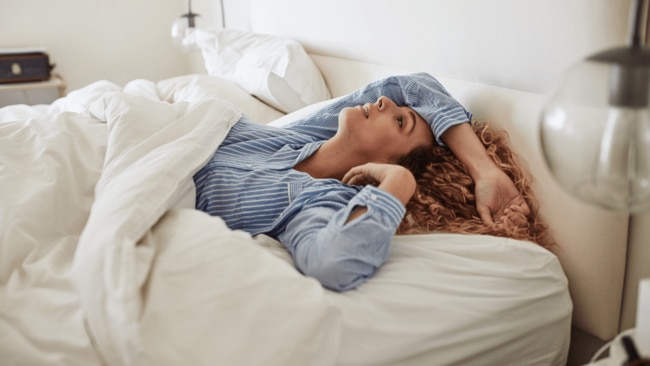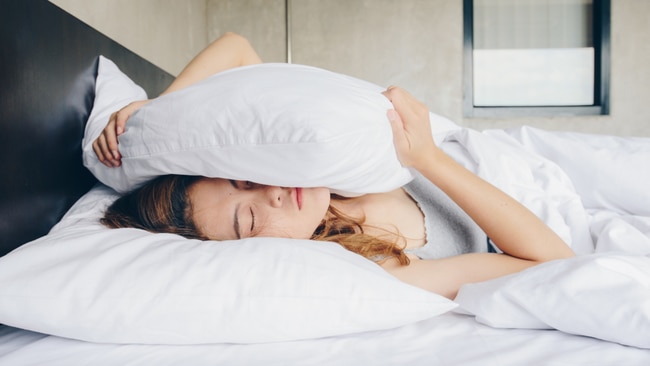This is why you have a bad sleep after a night out
Two drinks is all it takes

Lifestyle
Don't miss out on the headlines from Lifestyle. Followed categories will be added to My News.
Feeling less than well-rested after a big night? That's largely thanks to the effects alcohol has on your body, says sleep expert Rachel Beard.
It might surprise you that despite alcohol often making us feel sleepy, it actually prevents you from getting a night of quality sleep.
After two wines (or whatever your drink of choice may be), research shows we should brace ourselves for a disturbed sleep. But it’s not just alcohol that impacts our ability to achieve a good night's sleep. When we’re socialising, many of us throw our bedtime out the window in the name of fun — myself included — and the interrupted sleep schedule can lead to what’s called social jetlag.
So, how exactly does alcohol affect our slumber and why does a poor night’s sleep contribute to feeling a little dusty the next day? Let’s hop under the covers.
Like what you see? Sign up to our bodyandsoul.com.au newsletter for more stories like this.
Not all sleep is made equal
We’ve established that having a good sleep after a few drinks is a challenge, but why? To get into the science of it, drinking alcohol makes us feel drowsy because it makes our body produce adenosine, a chemical that induces sleepiness.
However, alcohol-induced adenosine production is always short-lived. While the effect is initially sedating, once your drinks are metabolised the effect is counter-productive to quality sleep. This, combined with the extra bathroom trips we often need to make during the night, actively prevents REM (Rapid Eye Movement)— a critical stage of our sleep cycle.
REM sleep is the most restorative stage of sleep — responsible for consolidating our memories, learning and rejuvenating our brains so they can absorb new information the next day. By cutting short this cycle, not only are we preventing our brains from converting experiences from the day into long-term memories, but are likely to wake up feeling groggy the next morning.
The sedative powers of alcohol can also over-relax our body, specifically our throat and jaw muscles causing a restricted airflow which can lead to snoring and in some cases sleep apnoea. These factors alone are enough for us to feel like we’ve woken up on the wrong side of the bed, but together it's a recipe for sleep deprivation.

Hangover or sleep deprivation?
Otherwise known as social jetlag, sleep debt refers to when we’re in a state of sleep deprivation that makes us less clear-headed and reduces our physical and mental performance while making us hungrier and more irritable.
The best way to prevent sleep debt is to maintain a consistent sleep schedule. This is achieved by waking up at a regular time each day, naturally prompting your body to go to bed at a more sensible time in the evening. Although, it’s easier said than done sometimes, especially in the midst of the end-of-year fun. If that still feels like it’s not feasible, take a nap throughout the day for an extra boost of sleep and to mitigate your sleep debt. Who doesn’t love a Sunday siesta?
When done right, naps can leave you feeling rested and rejuvenated, a welcome energy boost that no doubt many of us need as we enjoy the festivities. Naps have the power to improve mood, increase alertness and improve our physical and cognitive performance. Albert Einstein, Salvador Dali and Leonardo Da Vinci swore by a daily dose, and no one could accuse them of underperforming!
Even the most disciplined sleepers can be found guilty of slipping out of routine occasionally. Sometimes the social love we get from staying out a little bit too late with friends is too good to resist — and that’s okay if you know how to get your sleep back on track.
On a night out, ensure you’re drinking plenty of water and eating nutritious meals as you consume alcohol — helping you to soak up and flush out excess alcohol. Aim to give your body up to four hours (the time it takes to metabolise a standard drink) to process the alcohol before heading to bed. And if you’re worried alcohol may be a culprit of disrupted sleep, try a few weeks of going alcohol-free to see the difference it makes.
Rachel Beard is the sleep wellness manager for A.H. Beard.
More Coverage
Originally published as This is why you have a bad sleep after a night out




